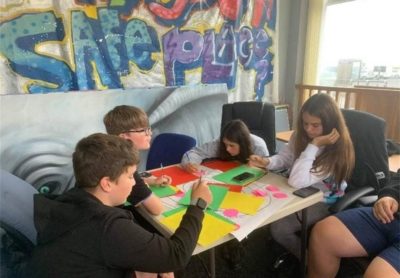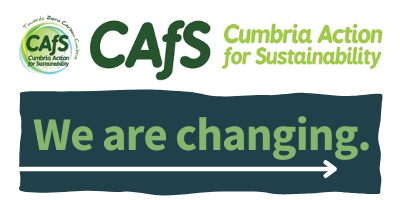Young people are highly aware of the threat to their futures from climate change yet are rarely able to influence the ‘gatekeepers’ of climate emissions – those decision makers in Cumbria whose strategies and plans can most affect our carbon emissions. To help address this we worked with Shared Future (a local not for profit organisation) to fund and create interactive sessions with youth groups which explored their views on climate change and shared their ideas with people and organisations across Cumbria.
In total 62 young people aged from 11 to 19 years took part in the workshop sessions which were co-designed and led by youth workers in Seascale, Millom, Frizington, Cleator Moor, Distington and Mirehouse and Woodhouse in Whitehaven during summer 2021. The participants focused initially on identifying their vision for their local area and then explored the issue of climate change and carbon emissions.
In parallel to these youth sessions, Shared Future also ran a Copeland People’s Panel on Climate Change with the help of funding secured by CAfS from the National Lottery’s Climate Change Action Fund. This Panel brought together 30 randomly selected local people who, over the course of several weeks, heard from experts about climate change and the actions that can be taken to tackle it. The Panel then debated and agreed its recommendations for action.
The parallel initiatives of the youth sessions and the People’s Panel were brought together by the presentation of the outcomes of the youth group sessions to the People’s Panel just before the latter drafted its recommendations. This had a significant effect on the Panel which said ‘We have been inspired by the work of young people in youth groups across Copeland and our recommendations echo what many of them have said.’
The outcomes of the youth group discussions have also been presented more widely and directly to key decisionmakers across Cumbria through the Zero Carbon Cumbria Partnership – which is a group of around 80 organisations including local authorities, community groups, businesses and other influential bodies that are collectively planning Cumbria’s pathway to net zero.
The young people of Copeland want to see better, more affordable and reliable public transport, electric cars and chargepoints and walking and cycling encouraged, along with more recycling. They want more solar and wind turbines and energy efficiency improvements at home. They want their local environment to be cleaned up and they want more jobs, especially low carbon jobs, with training.
The Zero Carbon Cumbria Partnership is committed to ensuring young people have more opportunities to speak, to be heard and to influence action now which affects their futures.
A report detailing the youth group process and the findings in full is available here Youth-Group-Report-Draft-10.pdf (cafs.org.uk).
The recommendations of the Copeland People’s Panel are available here: Copeland-report-v0.4.pdf (sharedfuturecic.org.uk)
For more information about the Zero Carbon Cumbria Partnership see our project page.
For more information about CAfS youth engagement programme see our Youth Climate Action project page.


